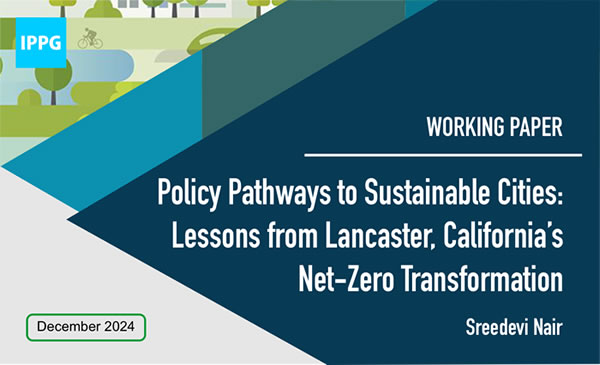Policy Pathways to Sustainable Cities

This working paper explores the strategies and policies that enabled Lancaster, California, to become the first net-zero emissions city in the United States (U.S.). Drawing on a comprehensive review of policy documents, academic literature, and media reports, the paper highlights how Lancaster’s strong leadership leveraged state and federal level policies, its administrative autonomy, and innovative policies and partnerships to advance its clean energy and sustainability agenda.
Key policy initiatives adopted by Lancaster included mandating renewable energy use for residential and commercial buildings, revising municipal codes to accelerate renewable energy adoption, simplifying permitting processes, and introducing financial incentives for residents and businesses. In addition to these measures, Lancaster implemented a comprehensive strategy to decarbonize its transportation sector. This included putting in place policies to accelerate electric vehicle (EV) infrastructure, supporting public transit electrification, and integrating renewable energy into transportation systems, further enhancing the city’s carbon reduction efforts.
The findings offer important insights into the transformative role of local governance in advancing climate action, particularly for urban areas in developing economies. The paper also identifies lessons and best practices that can be adapted to inform policy and practice in the implementation of climate action strategies in cities worldwide, with a focus on their applicability to emerging markets and developing regions. Further research, including stakeholder interviews, will expand on these findings to provide a deeper analysis of Lancaster’s success and its potential replication in other urban contexts.

 Previous Post
Previous Post Next Post
Next Post